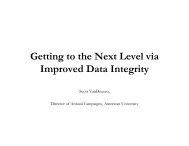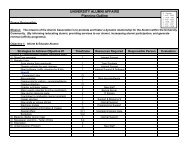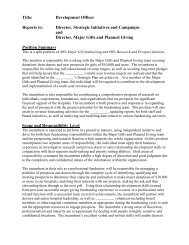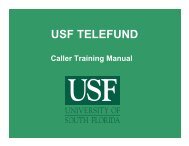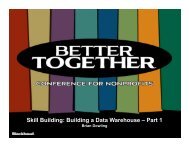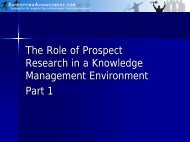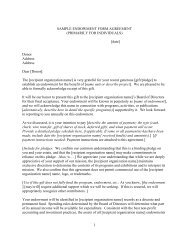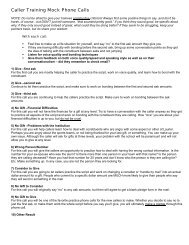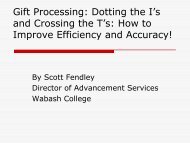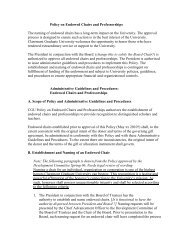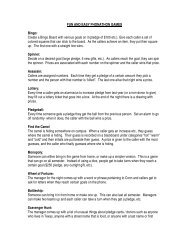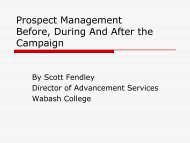WealthEngine Best Practices in Higher Education for Prospect ...
WealthEngine Best Practices in Higher Education for Prospect ...
WealthEngine Best Practices in Higher Education for Prospect ...
You also want an ePaper? Increase the reach of your titles
YUMPU automatically turns print PDFs into web optimized ePapers that Google loves.
<strong>Best</strong> <strong>Practices</strong><br />
Tips <strong>for</strong> Protect<strong>in</strong>g Your Data With<strong>in</strong> your Department<br />
Restrict access to data files (<strong>in</strong>clud<strong>in</strong>g donor and prospect <strong>in</strong><strong>for</strong>mation) to only those employees who require access.<br />
Ensure any pr<strong>in</strong>ted/paper files are kept <strong>in</strong> a locked file cab<strong>in</strong>et or secure room.<br />
Educate development staff and fundrais<strong>in</strong>g volunteers, <strong>in</strong>clud<strong>in</strong>g trustees and board members, on the process and purpose of<br />
prospect research and their roles <strong>in</strong> protect<strong>in</strong>g the data.<br />
Develop an implementation plan <strong>for</strong> data use and clearly outl<strong>in</strong>e who has access and what data should be entered <strong>in</strong>to your<br />
donor management system (DMS).<br />
Don’t share passwords <strong>for</strong> your onl<strong>in</strong>e research tools or your FTP site(s) unless necessary. Only share this <strong>in</strong><strong>for</strong>mation with<br />
employees who need to know the <strong>in</strong><strong>for</strong>mation. In cases of staff turnover, be sure to change passwords that grant access to<br />
sensitive data.<br />
Use encryption technology on computers that house or use confidential data on a regular basis.<br />
Outl<strong>in</strong>e consequences <strong>for</strong> data theft or negligence.<br />
Protect from outside technology threats such as computer viruses or phish<strong>in</strong>g scams by updat<strong>in</strong>g anti-virus and anti-spam<br />
software regularly.<br />
Keep all data, <strong>in</strong>clud<strong>in</strong>g copies of checks and f<strong>in</strong>ancial transactions, only as long as required.<br />
Properly dispose of electronic and hard copies. Be sure to use a shredder when dispos<strong>in</strong>g of hard-copy data so that the<br />
<strong>in</strong><strong>for</strong>mation rema<strong>in</strong>s confidential.<br />
Tips <strong>for</strong> Protect<strong>in</strong>g Your Data When Send<strong>in</strong>g Data to a Vendor<br />
Ensure that a s<strong>in</strong>gle person on your staff is responsible <strong>for</strong> file submission.<br />
Only <strong>in</strong>clude data that is relevant to the service that the vendor provides.<br />
Do not transfer data via email; use secure methods such as file encryption or SFTP.<br />
Tips <strong>for</strong> Protect<strong>in</strong>g Your Data When Communicat<strong>in</strong>g with Constituents<br />
Be up front about your prospect research. Consider post<strong>in</strong>g a statement on your website or <strong>in</strong> your public privacy policy about<br />
data m<strong>in</strong><strong>in</strong>g. Transparency up front helps assuage issues later.<br />
Develop a policy statement outl<strong>in</strong><strong>in</strong>g process/policies/FERPA compliance to be distributed to constituents who question research<br />
processes or practices.<br />
Allow constituents an opt-out option <strong>for</strong> fundrais<strong>in</strong>g activities.<br />
The Family <strong>Education</strong>al Rights and Privacy Act (FERPA) (20 U.S.C. § 1232g; 34 CFR Part 99) is a federal law that<br />
was orig<strong>in</strong>ally enacted August 21, 1974 to protect the privacy of student education records. All schools that receive<br />
fund<strong>in</strong>g under an applicable program of the U.S. Department of <strong>Education</strong> are subject to FERPA. Accord<strong>in</strong>g to the<br />
law, parents and eligible students (those who have reached 18 years of age or attend a school beyond high school)<br />
have the right to review the student’s education records. Parents and eligible students also have the right to<br />
request that the school correct <strong>in</strong>accurate or mislead<strong>in</strong>g <strong>in</strong><strong>for</strong>mation with<strong>in</strong> the record as well as opt-out of certa<strong>in</strong><br />
disclosures. In 2008, FERPA was amended to <strong>in</strong>clude language regard<strong>in</strong>g provisions of the USA Patriot Act and the<br />
Campus Sex Crimes Prevention Act, which added new exceptions permitt<strong>in</strong>g the disclosure of personally identifiable<br />
<strong>in</strong><strong>for</strong>mation from education records without consent and also clarified a number of terms written with<strong>in</strong> the<br />
orig<strong>in</strong>al law such as personally identifiable <strong>in</strong><strong>for</strong>mation, directory <strong>in</strong><strong>for</strong>mation, and education records. The fundrais<strong>in</strong>g<br />
department is not exempt from FERPA and there<strong>for</strong>e any established security policy should con<strong>for</strong>m to FERPA<br />
regulations <strong>in</strong> addition to other federal, state and local laws.<br />
38 | <strong>WealthEng<strong>in</strong>e</strong>



